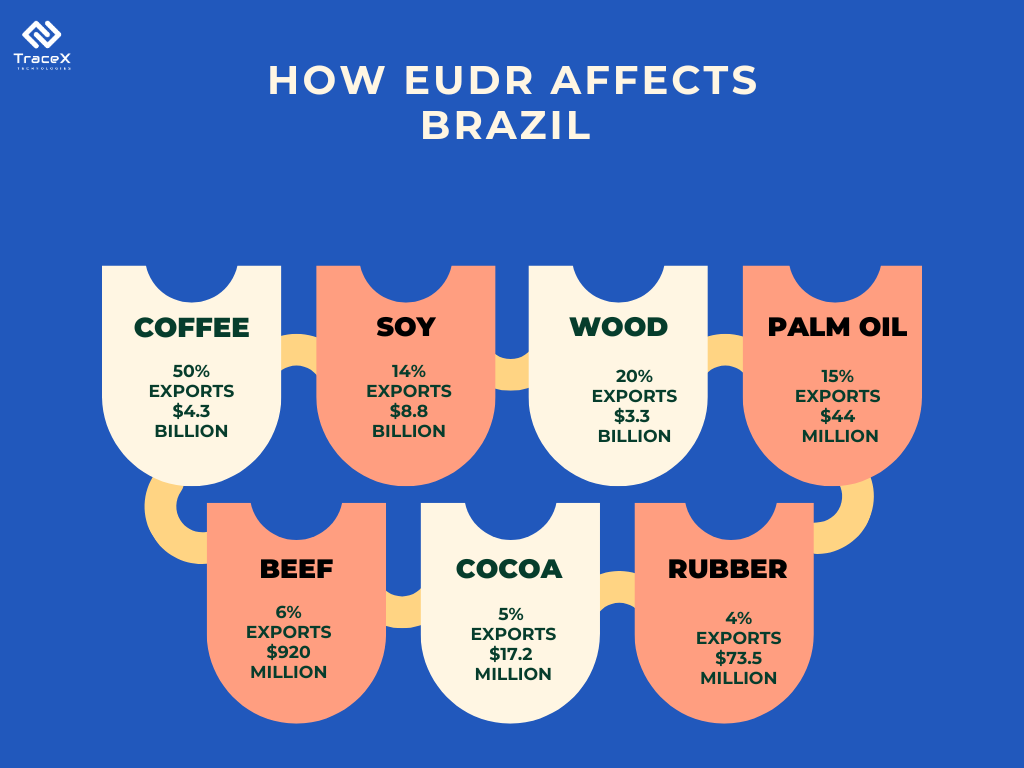Contact: +91 99725 24322 |
Menu
Menu
Quick summary: The EU Deforestation Regulation (EUDR) impacts Brazilian agriculture, requiring compliance with strict sourcing regulations. TraceX's EUDR compliance software helps farmers and exporters navigate these requirements, promoting sustainable practices and traceability. By leveraging innovative solutions, Brazilian agriculture can comply with EUDR, contribute to a greener future, and maintain access to the European market. This regulation encourages sustainable agricultural practices, supports smallholders, and promotes social equity, leading to a more resilient and environmentally conscious agricultural sector in Brazil.

Brazil’s agricultural sector is a powerhouse, a global leader in the production of soybeans, coffee, and other key commodities. However, this success story comes with an environmental cost. Deforestation in the Amazon rainforest, linked to agricultural expansion, has sparked international concern. The recently implemented EU Deforestation Regulation (EUDR) throws a new hurdle for Brazilian agriculture, potentially limiting exports to the lucrative European market if producers cannot demonstrate responsible sourcing practices. Traceability solutions like can empower Brazilian farmers and businesses to comply with the EUDR, navigate this evolving landscape, and achieve sustainable growth while protecting their rainforests.
The Brazilian Confederation of Agriculture and Livestock (CNA) warns that a new EU regulation aimed at deforestation could impact nearly 30% of Brazil’s exports to the European Union.
The EUDR aims to curb deforestation by ensuring that products entering the EU market do not contribute to the destruction of forests. It requires companies to prove that their supply chains are free from deforestation, which involves stringent due diligence and traceability measures. Key commodities targeted by the regulation include soy, beef, palm oil, coffee, cocoa, and wood products, many of which are significant exports for Brazil.
Brazilian agricultural exporters face increased trade barriers as they must comply with the EUDR’s stringent requirements. This includes providing detailed documentation proving that their products are not linked to deforestation. For many Brazilian farmers and exporters, especially smallholders, the cost of compliance can be prohibitive. They may need to invest in new technologies for monitoring and reporting, as well as third-party audits, which can be expensive.
Compliance with the EUDR could also affect Brazil’s competitiveness in the global market. While large agribusinesses may have the resources to meet the new standards, smaller producers might struggle, potentially losing access to the lucrative EU market. This could result in market consolidation, where only the largest and most resourceful companies can afford to maintain trade relations with the EU, marginalizing smallholders and local communities.
On a positive note, the EUDR incentivizes sustainable agricultural practices. Brazilian farmers who adopt deforestation-free methods can gain a competitive edge and secure long-term market access. This can lead to better land management, preservation of biodiversity, and reduction in greenhouse gas emissions. Over time, these practices could contribute to a more sustainable and resilient agricultural sector in Brazil.
However, there is also a risk that the EUDR might not entirely eliminate deforestation but merely shift it to regions not covered by the regulation. For instance, if Brazilian producers find it too challenging to comply with the EUDR, they might pivot to other markets with less stringent requirements, potentially exacerbating deforestation in those regions.
The EUDR poses significant challenges for smallholders and indigenous communities in Brazil. These groups often lack the resources and technical know-how to comply with complex regulatory requirements. They may face exclusion from the supply chains of major exporters, leading to economic marginalization. Additionally, the increased demand for land traceability might inadvertently pressure indigenous lands, leading to conflicts and further social tensions.
Conversely, the EUDR could promote social equity if implemented with supportive measures for smallholders and indigenous communities. Providing technical assistance, financial support, and capacity-building initiatives can help these groups comply with the regulation, thereby ensuring their inclusion in sustainable supply chains. This can lead to improved livelihoods and greater social stability in rural areas.
The EUDR necessitates advancements in monitoring and traceability technologies. In Brazil, this has spurred innovation in satellite monitoring, blockchain for supply chain transparency, and other digital tools. These technologies can help farmers and exporters ensure compliance, track their products from farm to market, and provide verifiable data on sustainable practices.
Meeting the EUDR requirements also calls for improved infrastructure, such as better logistics, storage facilities, and transportation networks. This can have broader economic benefits for Brazil, enhancing the efficiency and sustainability of its agricultural sector. However, the initial investment required for such infrastructure upgrades can be substantial.
The EUDR encourages alignment with Brazil’s national policies on deforestation and climate change. It supports Brazil’s commitments under the Paris Agreement and its national strategies for reducing deforestation and promoting sustainable land use. By adhering to the EUDR, Brazil can bolster its environmental credentials on the global stage.
Despite these potential benefits, the EUDR also presents regulatory challenges. The Brazilian government needs to develop and enforce robust frameworks for land use, forest conservation, and agricultural practices. This requires effective governance, transparency, and cooperation between federal, state, and local authorities, which can be challenging in a country as large and diverse as Brazil.

The European Union Deforestation Regulation (EUDR) presents significant challenges for Brazilian agriculture, but technology solutions, particularly EUDR compliance software, can play a crucial role in helping stakeholders meet these requirements effectively
EUDR compliance software enables comprehensive tracking of agricultural products from the farm to the final market. By integrating advanced technologies such as blockchain, satellite imagery, and IoT devices, the software can record detailed data, ensure data integrity and facilitate verification.
Meeting the EUDR requirements involves extensive documentation and reporting. Compliance software can streamline these processes by automating documentation, simplifying reporting and providing real-time updates.
Smallholders face significant challenges in complying with the EUDR due to limited resources. Compliance software can offer cost-effective solutions by providing affordable tools, offering training and pooling resources.
Compliance software helps in identifying and managing risks associated with deforestation and non-compliance by risk assessment, monitoring and alerts and audit support.
Facilitating Sustainable Practices
EUDR compliance software encourages and facilitates sustainable agricultural practices through best practices, resource management and incentivizing compliance.
By ensuring compliance with the EUDR, Brazilian agricultural producers can enhance their market access and competitiveness and enhance their brand value.
TraceX’s EUDR compliance platform empowers Brazilian farmers and businesses by providing:
A Nigerian trading firm leverages TraceX for supply chain compliance. The firm faced challenges in data accuracy, traceability, regulatory compliance, operational efficiency, environmental monitoring, and stakeholder coordination. TraceX’s solutions include a mobile app for data collection, end-to-end traceability, EUDR compliance reporting, a central platform for data management, GPS technology for farm boundaries, and a mobile app for communication. By implementing TraceX, the firm achieved enhanced data accuracy, improved traceability, operational efficiency, environmental compliance, and increased transparency.
The EU Deforestation Regulation (EUDR) presents both a challenge and an opportunity for Brazilian agriculture. While complying with stricter sourcing regulations requires adaptation, it also presents a chance to showcase Brazil’s commitment to sustainability and responsible land use. By partnering with innovative solutions like TraceX, Brazilian farmers and businesses can navigate the EUDR landscape with confidence. It can empower them to achieve compliance, build trust with consumers, and ensure continued access to the lucrative European market. By embracing sustainable practices, Brazilian agriculture can not only thrive in the face of the EUDR but also contribute to a greener future for our planet.
